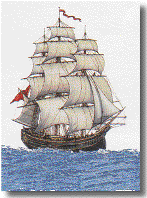Winds,
Poets and Navigators
by Rita Messeri
In 1806 the thirty-two year old Admiral Francis Beaufort of the Royal Navy invented a valuation scale for winds, classifying them on the basis of the effects of their speed; one could say that the Beaufort is to winds as Mercalli is to earthquakes.
It is useful to give a numerical value to wind velocity, so that the most effective methods for countering or exploiting its effects can be found, especially in the sphere of navigation. But, beyond this need, what is it that urges man to attempt to define the elusive? The function of scientific research is the rational and lucid observation of a natural phenomenon, so that it is no longer a source of fear , but is rather "domesticated".
Nevertheless, the effects described in the Beaufort Scale reveal something which goes beyond scientific interest: what we discover there is poetry. Let us take a step back in time, to about 53 B.C, the period in which Titus Lucretius Carus (c.99 - 55 B.C.) composed the De Rerum Natura /On the Nature of Things, a poem in six books.
The first two deal with atomic physics, the third and fourth with man and his urges, passions and instincts, while the last two describe the history of the cosmos and of humanity. The passage we are interested in comes from the first book: "...above all the unbridled force of the wind thrashes the ocean, sending heavy ships to the bottom, scattering the clouds, and at times its swift gales sweeping over the plains tear down massive trees..." and again "...it furies in such a way the wind, with shrill whistling, raging with threatening roar. Undoubtedly, therefore, the winds are invisible bodies, sweeping the sea, the lands and the clouds of the sky...".
Here is a poet who feels the need to materialise the invisible, and his inheritance is taken up, more than eighteen centuries later, by a young admiral who integrates the vivid poetic description of Lucretius into a system of numbers: we find it between the 9th and the 11th grade of the Beaufort Scale, which on close reading reveals its poetic vein.
Perhaps Beaufort didn't know Lucretius, can we ever know? He certainly didn't live long enough to know the poems of the American poet Emily Dickinson (1830-1886), whose literary activity exploded around 1860, when our Admiral had already been dead for three years:
"The Wind took up the Oorthern Things
And piled them in the south
Then gave the East unto the West
And opening his mouth
The four Divisions of the Earth
did make as to devour
While everything to corners slunk
Behind the awful power...."
And if here Dickinson is, like Beaufort, an observer of the effects of the wind, in the verses which follow she becomes a "researcher" with a formula full of doubts, venturing beyond the visible:
"I think that the Root of the Wind is Water
It would sound so deep
Were it a Firmamental Product
Airs no Oceans keep
Mediterraneans intonations
To a Current's Ear
There is a maritim convinction
In the Atmosphere".Perhaps the best reply to our initial question, what is it that urges man to materialise the elusive, comes from Pablo Neruda (1904-1973) in his Ode to the Air (Elemental Odes, 1954/59):
"...monarca o camarada,
hilo, corola o ave,
no sé quién eres,pero
una cosa te pido,
no te vendas."The poet of human freedom could not but sing the freedom of the air, the only riches of the poor:
"..tu eres lo ùnico que tienen
por eso eres transparente,
para que vean
lo que vendrà manana,
por eso existes,
aire, déjate respirar,
no te encadenes...""..ya vendrà un dià
en que libertaremos
la luz y el agua,
la tierra , el hombre,
y todo para todos
serà, como tu eres."And here, limxid, blatant and undeniable, the tragic cliché emerges: those who pollute the air do not read Poetry. The profits of those who practise deforestation, of the hyper-manufacturers creating hyper-consumers is in inverse proportion to their literary memory. Or perhaps it is that both our national and foreign tycoons only recall that phrase by which Carmina non dant panem, Poetry does not produce bread; that's true, but it gives so many answers.
|

